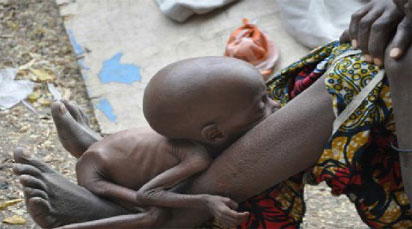
By EMMANUEL OSADEBE
TO gain the nutritional substances that provide energy for activities, growth, and other functions of the body while keeping the immune system healthy, food is essential for a human being.
The United Nations global facts show that in 2020, between 720 million and 811 million persons worldwide were suffering from hunger, roughly 161 million more than in 2019; a staggering 2.4 billion people, reflecting above 30 per cent of the world’s population, were moderately or severely food-insecure, lacking regular access to adequate food; and globally, 149.2 million children under the age of five, or 22.0 per cent, were suffering from stunting (low height for their age) in 2020.
These were some of the food and nutritional crises that the United Nations Member States envisaged when Goal 2 of the Sustainable Development Goals, SDGs, was adopted, which seeks to end hunger and ensure access by all people, in particular the poor and people in vulnerable situations, including infants, to safe, nutritious and sufficient food all year round by 2030.
In Nigeria, all the indicators of undernourishment, child stunting, child wasting, and child mortality combine to give Nigeria the ranking of 103 out of 121 countries under the Global Hunger Index in 2022. The index indicates that 12.7 per cent of Nigeria’s population is undernourished, 31.5 per cent of children under five are stunted, and 6.5 per cent of under-five children are wasted. With 133 million Nigerians reported to be multidimensionally poor, without access to necessities of life like food, education, quality healthcare, sanitation, and nutrition, among others, it means 63 per cent of Nigerians are living within the extreme line of poverty.
What then is Nigeria’s Zero Hunger policy and what strategies do we intend to create a Nigeria free of hunger in 2030 or at least in 2060 when Nigeria will be a hundred years as a sovereign country? How is Nigeria navigating the effects of multiple global crises such as conflicts, COVID-19 pandemic, climate change and growing inequalities converging to undermine global food security?
These are not questions that demand answers from the Federal Government alone; these are questions that urgently demand sustainable commitments from all stakeholders in the zero hunger ecosystem – governments, private sector-led commitment to food access and non-profits engagement in both holding leaders accountable on Zero Hunger Policies and providing food assistances to vulnerable communities.
To ensure that the 133 million multidimensionally poor Nigerians do not continue to go to bed hungry each day, government must swiftly reduce the causes and main drivers of hunger crisis such as insecurity and herder-farmer conflicts in rural areas of Nigeria; and launch a national Zero Hunger policy and food security strategy at all levels of government – federal, state and local governments.
No doubt, Nigeria has adopted a wide range of policy instruments and measures since the early 1970s, but such food policies have not been as effective as intended. Consider the Federal Government’s free school meals programme: while the sound-bite is good, the implementation can only be felt effectively by the intended beneficiaries when it is free of corruption and expanded to benefit more Nigerians within the poverty belt.
Such a policy plan must be specific on how to reduce the number of households experiencing hunger and cut diet-related diseases by increasing access to healthy food by 2030. There is so many individuals and corporations can do but government has the key to ending structural poverty and inequality, particularly at the subnational.
More importantly, the tool for achieving a sustainable solution to end hunger is to educate, empower and expand opportunities for everyone.
When one person, particularly a girl-child in a rural area, is educated, it has a ripple effect that has a far-reaching impact on communities.
It will be difficult to lift those living in poverty out of poverty unless Nigeria provides unrestricted access to quality education.
Education, improved and mechanised agriculture, healthcare and access to finance in rural areas are crucial resources that every nation needs to break its poverty cycle.
To achieve a sustainable result in this drive, Nigeria needs a disciplined deliberateness in accountable, inclusive, humane, people-driven, and transformational leadership at all levels and spheres of our society, including in traditional and religious spaces.
Collectively, we must make food an instrument of social solution both for the individual and society. Since we cannot have food security without physical and environmental security, everyone must take responsibility to ensure that poor and vulnerable Nigerians have access to quality food.
It is in line with this reasoning that the T200 Foundation brings life-saving food and nutrition assistance to people affected by social conflicts and people who are in need of food. We understand that to make change happen, we must invest in people, invest in their stomachs, and invest in their smiles.
The T200 Foundation’s food intervention is helping to bring smiles to the faces of hungry Nigerians. The Feed the Hungry initiative of T200 is focused on feeding vulnerable groups across the 36 states of the Federation and the FCT. The programme which started on December 16, 2022 at the Area 1 IDP camp, has identified, 7000 thousand people at the EYA CAN Centre Camp in Maiduguri to be fed in January 2023.
But even as we drive our commitment to achieving zero hunger in Nigeria, we are aware that everyone must be involved in prioritising initiatives that creatively drive hunger out of our communities. It is important for everyone to be involved because a hungry nation is an angry nation. Zero hunger is possible, and we must make it happen.
Osadebay is the Executive Director, T200 Foundation
Disclaimer
Comments expressed here do not reflect the opinions of Vanguard newspapers or any employee thereof.